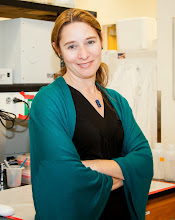I know I said I was going “off the air” until I moved, but I heard a terrific conversation this morning on the local NPR station and couldn’t help sharing a few thoughts…with so much going on right now I sure have plenty of thoughts to share!
Today’s Weekday guest was bioethics professor Dr. Jonathan Moreno from the University of Pennsylvania. Dr. Moreno and host Steve Scher talked about serious ethical issues in experimental biology, from stem cells and regenerative medicine to personal genome sequencing. For those in the Seattle area, Dr. Moreno will be speaking at the University of Washington on 10/25/11 at 3:30 PM.
While the conversation itself was fascinating, what really resonated for me (and perhaps some of you) was the repeated call for scientists to leave the lab sometimes and engage the public in honest dialog about what we do and why it is important - how has science transformed our world? These conversations are critical when we work on potential hot-button issues such as stem cells or genetic engineering, but insight into how science works and how the world will benefit is important at all levels.
Not a new message, but still an important one. If we want the public to understand and support science, it’s up to us to explain it clearly!

No comments:
Post a Comment